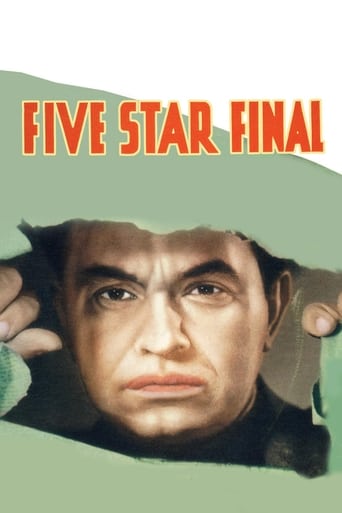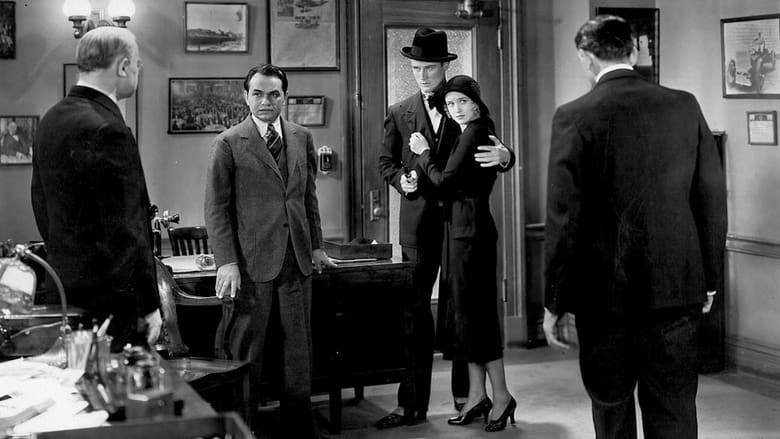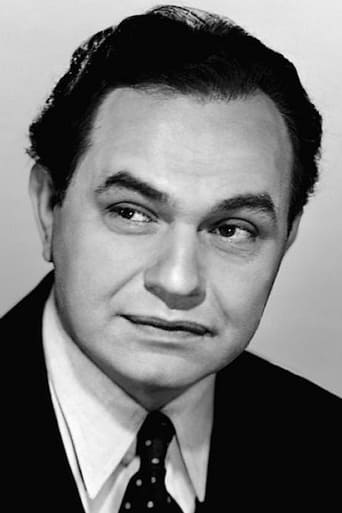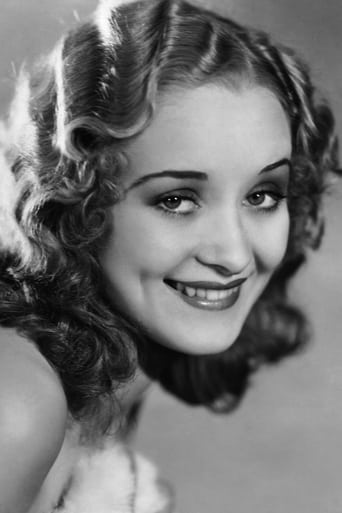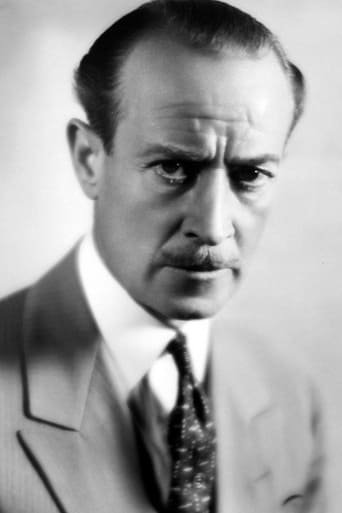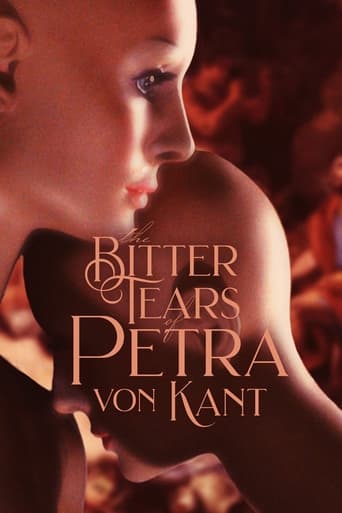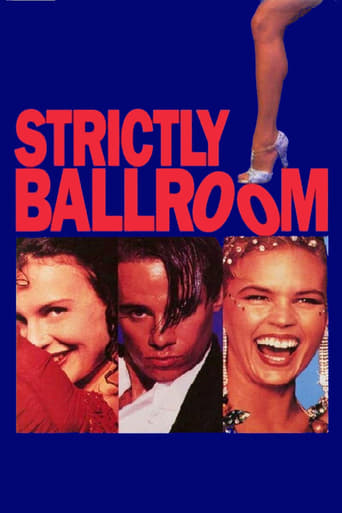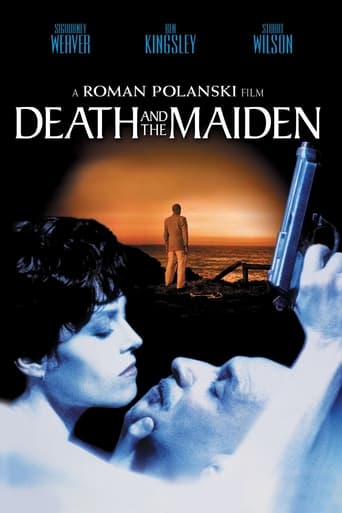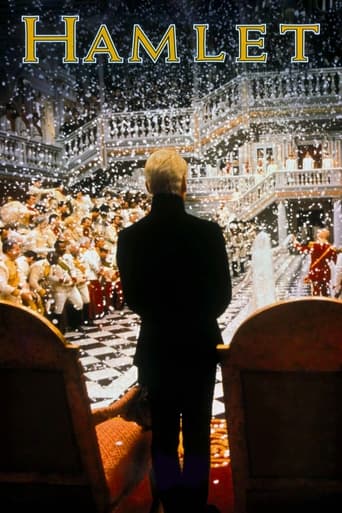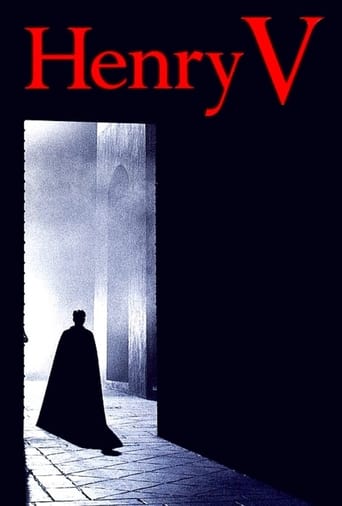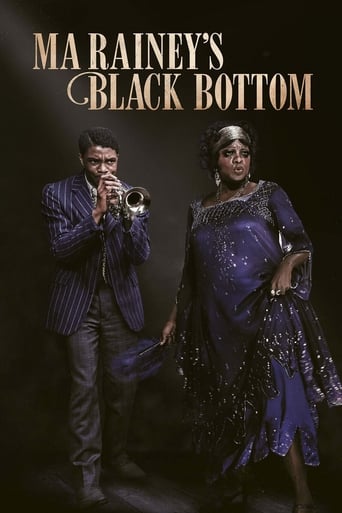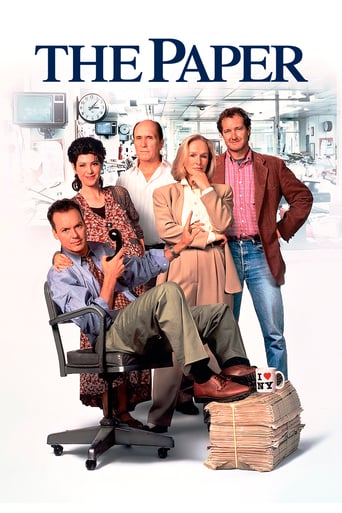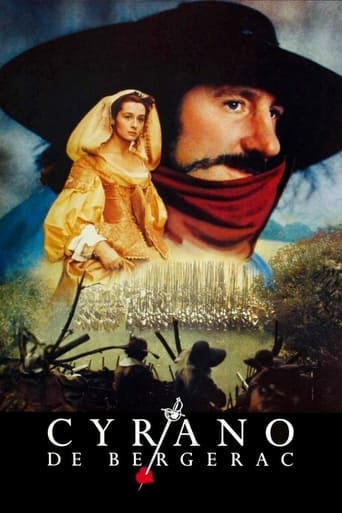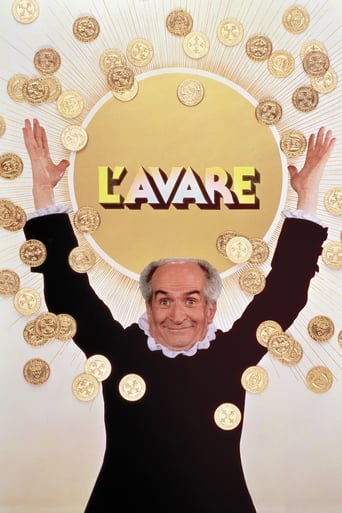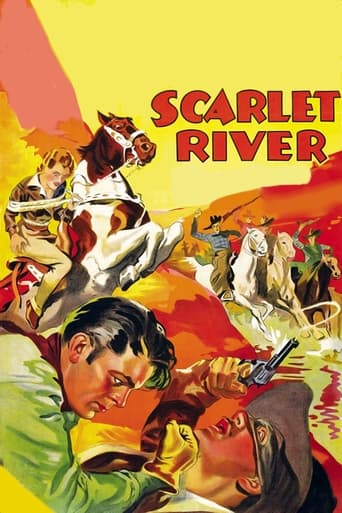Five Star Final (1931)
Searching for headlines at any cost, an unscrupulous newspaper owner forces his editor to print a serial based on a past murder, tormenting a woman involved.
Watch Trailer
Free Trial Channels
Cast


Similar titles
Reviews
Although it has its amusing moments, in eneral the plot does not convince.
A story that's too fascinating to pass by...
The film's masterful storytelling did its job. The message was clear. No need to overdo.
The storyline feels a little thin and moth-eaten in parts but this sequel is plenty of fun.
Directed by Mervyn LeRoy, with an adaptation by Robert Lord, this newspaper drama was nominated for Best Picture of 1931 by the Academy of Motion Picture Arts and Sciences. The most notable character in the film is played by Edward G. Robinson who, along with his performance in another LeRoy picture that same year (Little Caesar (1931)), showed signs of his tremendous versatility early in his 5+ decade long film career. The fact that Robinson was NEVER EVEN NOMINATED for an acting Oscar is perhaps the greatest of the many oversights in the Academy's storied history.Joseph Randall (Robinson) is an editor for the Gazette, a rather trashy paper (the Gazette) he'd begun to clean up when his bosses - owner Hinchecliffe (Oscar Apfel), Robert French (Purnell Pratt) and Brannegan (Robert Elliott), in charge of circulation & advertising - convince him to find out "what ever happened to" Nancy Voorhees (Frances Starr), a paroled murderess who'd killed her husband 20 years ago, and make a week-long story of it to sell more papers.Aline MacMahon is also notable, in her film debut, serving as Randall's secretary with a conscience that reflects his own, which is (at least, temporarily) buried by the fear of losing his job. Another colorful character is George Stone, who plays a slimy newspaper "handyman" in Randall's employ that finds other methods, including some outlandish ideas, to enhance the Gazette's circulation.As it turns out, the murderess's daughter (the beautiful 17 year old Marian Marsh) is about to marry the son (Anthony Bushell) of wealthy parents. However, neither the murderess's daughter nor her prospective in-laws know of her mother's past because Voorhees had remarried (H. B. Warner), which changed her name to Townsend. The daughter doesn't even know that Townsend isn't her father, a superfluous plot point that is never learned nor exploited.Randall uses a new, well endowed reporter Kitty Carmody (Ona Munson) and his wily, though frequently drunken investigative veteran "Reverend" Isopod (Boris Karloff) to find the missing murderess and get today's story. Naturally, printing the story will affect the interested parties lives irreversibly, so the former murderess and her current husband do everything they can to appeal to Hinchecliffe and Randall to stop the "five star final" (the last edition of the day).Of course, the newspaper men run with it and achieve their desired circulation results, which prompts even more drastic actions from (eventually) each of the three Townsends. The scenes in which Randall realizes he can't wash his hands of his responsibility in the tragedy that befalls the Townsends are Robinson's, and the film's, most powerful.Too bad the editors of today's formerly respected big name newspapers don't (evidently) feel the shame, nor the guilt, for what their papers deem fit to print in this day and age!Remade as a B movie five years later as Two Against the World (1936), which is also shown as One Fatal Hour (1936) on TCM.
Five Star Final is 85 years old yet nothing has changed in that the public still has an appetite to read about filth in newspapers. The themes here would be looked at in many newspaper comedies throughout the 1930's, however this is no screwball comedy - it's deadly serious. I guess we can't say "back in my day journalists had ethics". The real life inspiration for Five Star Final came from a New York tabloid called New York Evening Graphic. At the time of the film release the Evening Graphic was losing circulation because its new editor was attempting to make it a more respectable paper, just like the character of Randall played by Edward G. Robinson the editor of the fictional tabloid newspaper The Gazette.Randall is an editor who is not without ethics. Despite the objections of the paper's management, "Randall won't print pictures of girls in underwear in the pictures section" and prints cables from The League of Nations. The pressure is on him to stop printing "actual news" and more sensationalist stories and gossip. When Randall gives in we see the full sleaze of Edward G. Robinson; after all nobody could do sleaze better than him.The stealer of the show however is Boris Karloff as Isopod. This isn't a horror movie but his performance feel like one straight from a horror picture with is distinctive, eerie voice. Isopod is a disgraced priest of whom Randall disguises as a practicing priest to go undercover and do the paper's dirty work; a creep who is full of crap and as Randall puts it "You're the most blasphemous looking thing I've ever seen". The name Isopod in Greek means 'even footed' but more commonly is the name an unpleasant looking order of crustacean parasites so I guess it works.The Gazette has a number of shady practices; they bully retailers and vandalise their stalls for not putting their papers on top. Likewise they employee a pretty girl played by Ona Munson to do dirty work for the paper although the main reason they're choosing her for the job is that she's not flat chested, as evident by the shot in which Aline MacMahon is clearly looking at her rack (even Isopod enjoys checking her out).In order the increase the circulation of The Gazette, Randall unearths a 20 year old murder case for the sake of a sensational story later titled, "Famous Killer's Girl to Wed Society Man". Today with this internet thing we've got going on it would be highly unlikely someone could hide the fact they were once tried for murder while Isopod could just get a photograph of the murder's daughter on Facebook. But the fact remains the same: sensationalist news stories can affect the lives of innocent associates.The film has a truly superb cast with everyone having their moment in the sun and this being a film set in the world of journalism, the dialogue flows at a rapid fire rate; a form of acting which is truly a thing of the past. Marian Marsh's breakdown at the end is hair raising melodramatic brilliance, even if her husband just happens to walk in as she pulls out a gun in a delightfully improbable turn of events.The production values are excellent helmed under the great director Mervyn Le Roy (such an impressive back catalogue). The use of sound in the opening credits with boys shouting "extra!" and the noise of the printing press sets the atmosphere while it's evident the studio strived for this production to have authentic sets. Many shots in Five Star Final have an impressive level of depth such as that of George E. Stone with his feet up in foreground as he sits back while on the phone.Five Star Final contains innovative use of split screen as Mrs Voorhes (Frances Starr) in the middle of the frame is trapped between paper employees who go about their business as usual and try to ignore her but also shows the paper as voyeuristic spies. Yes, the filmmakers sure love their symbolism here. Throughout the film Randall is constantly washing his hands ("50 times a day" apparently) while the paper employees going to the bar and drink in order to deal with their conscience. Likewise Randall's closeted love interest Miss Taylor played by Aline MacMahon has feelings towards him but objects to his job and the paper; she is symbolic of his conscious. To top it all off, the film ends with an image of the paper lying in the gutter like the filthy rag it is; a final powerful image to stick in your mind.
The film is a pre-code talkie based upon a hit Broadway play that was written by a former newspaper managing editor. Long ago early talkies became dated (archaic sound, stagy performances) even though their messages may still be valid. So while we may dismiss the old-fashioned melodramatics of "Five Star Final," the movie message still holds true. Reckless news reporting is still a topic today, whether to improve television ratings, perk up website "hits," or advance a failing newspaper's circulation. "Evening Gazette" publisher Bernard Hinchecliffe (Oscar Apfel), concerned because of a drop in circulation (circa 300,000), approaches intense Managing Editor Randall (Edward G. Robinson) to spice up issues with more "human interest stories" (meaning seedy stuff). Circulation and advertising execs French (Purnell Pratt) and Brannagan (Robert Elliott) concur with Hinchecliffe. So Randall cracks under pressure from his bosses and rekindles a twenty-year old sensational murder case. That involved a pregnant stenographer Nancy Voorhees (Frances Starr) who shot her adulterous lover for not marrying her. Hinchecliffe wants a follow-up story as to how Nancy is living. Of course, the fact that reopening the nearly forgotten case will hurt innocent people falls off the deaf ears of the three bigwigs. Nancy, who has moved on with her life, is living a quiet existence with bank cashier husband Michael Townsend (H.B. Warner) and college student daughter Jenny (Marian Marsh). Jenny does not know that (1) her mom once murdered a man and that (2) Mr. Townsend is not her biological father. Now Jenny is marrying nice-boy Philip Weeks (Anthony Bushell), son of well-to- do parents. His adamant father is a successful machinery manufacturer; neither he nor his heinous wife wants any bad publicity.To uncover the latest information on Voorhees, Randall hires sleazy reporter Kitty "Legs" Carmody (Ona Munson) and teams her with amoral undercover reporter Isopod (Boris Karloff). Isopod was formerly kicked out of divinity school. Using some of the most sordid tactics seen in early talkies, the latter takes the unsuspecting Townsend couple into his confidence (bad mistake) and so they provide him with the information that he needs. Soon the story hits the headlines just before the planned wedding and results in more than one tragedy and a volatile finale.Robinson was good as usual, and he is better here than when snarling (and without any virtues) as a gangster in those stereotypical and violent movies that starred him. Here he is constantly washing his hands and drinking at Corcoran's speakeasy (The Volstead Act is still in force), symbolic of his guilty conscience bubbling just below the surface. Aline MacMahon, as outspoken stenographer Taylor in love with Randall, is satisfying also. So was pretty Marion Marsh ("Why did you kill my mother?"). Karloff succeeds as the repulsive reporter. Catch his signature line when he enters Randall's office: "Good e-e-evening." Known for sharp dialog, sexual innuendo, and social satire, "Five Star Final" was nominated for an Academy Award for Best Picture, but it lost to "Grand Hotel". Like many early talkies it is quite histrionic. A curious item of note involves pint-sized George E. Stone who plays contest manager Ziggie Feinstein. Now Ziggie calls up Dinky Ginsberg complaining about "a wise Arab" on 46th Street who owns a rival newsstand. "Take a couple of brass knuckles and do your stuff. Wow, the guy's a thug! Ziggie then calls City Commissioner Jim Donovan on the telephone to "lay down a route" as he will stage a one thousand-car cab race from the Bronx to the City Hall. Feinstein's reward to Donovan is a case of "cut" scotch. So much for the Volstead Act! Now Randall had earlier quipped that the race will kill a hundred people. But Ziggie is persistent, and tells Donovan that he already has the race fixed: "I'm gonna let an Irishman, a Jew, and a Wop win." Whoaaaa, now we know the flick's pre-code! And where is the protest for such a slur?
As a former jackal of the press myself, I get a big kick out of newspaper movies. FIVE STAR FINAL is one of the best, ranking alongside THE FRONT PAGE and its various remakes, CITIZEN KANE, MEET JOHN DOE, the little-known DEADLINE, U.S.A. (with Bogart as a crusading editor), ALL THE PRESIDENT'S MEN, and ABSENCE OF MALICE. (I'm probably leaving out a couple of other favorites but those are the ones that come to mind at this writing.) This film has three things going for it. The story, based on a play that opened in 1930, was probably more relevant in that era than today. Most news outlets (excluding those that are exclusively on the internet) now are more respectful of the privacy of private citizens than are the employees of the Evening Gazette; and I've never known a reporter or photographer who lied about being one to get a story. But an intimate followup on the "crime" committed twenty years earlier by Nancy Voorhees -- and for which she was not convicted -- was the type of sensational bread-and-butter that certain sleazy newspapers pursued before World War II. (Today's sleazy tabloids, print and electronic, are far more likely to go after real celebrities who hunger for any kind of publicity. And many so-called internet journalists, without training, editing, or professional standards, are much worse.) Though this kind of yellow journalism is an aberration in today's newspaper industry, in 1930 it was all too prevalent, especially in the cut-throat world of New York City's intensely competitive dailies. It's very representative of the era, and on top of that it's just a good yarn.The supporting actors are extremely well-cast. Aline MacMahon as the editor's lovelorn secretary, George E. Stone as the paper's staff bootlegger and fixer, H.B. Warner as the understanding husband of Nancy Voorhees, and Oscar Apfel as the villainous publisher Hinchcliffe are particular standouts. It's interesting to see Boris Karloff in a pre-FRANKENSTEIN role, though it's difficult to think of him as a womanizing reporter. Some may find the acting in the film too stagy and overdone, but if you can adjust your expectations and accept the dated style, it works very well.Then there's Eddie G. He had just achieved stardom with LITTLE CAESAR when FIVE STAR FINAL was made, and despite the excellent competition he commands the screen as the Gazette's editor, who is both repelled by the betrayal of his journalistic ideals and excited by the repellent story he's ordered to pursue. The hand-washing (which actually occurs only about three times in this 90-minute movie) is a perfect metaphor for his guilt, and his reliance on the bottle was (maybe still is) all too common an occupational hazard for newspapermen of this era. At film's end, we finally get the emotional explosion that has been building in Robinson throughout the movie. Very satisfying. What a shame this actor never received even an Oscar nomination, much less a statuette (except for an honorary one awarded after his death.)FIVE STAR FINAL was nominated for the best picture Oscar in 1931 but lost out to CIMARRON. Guess which film has aged less. Despite the dated setting and story, FIVE STAR FINAL still crackles with passion and humor. It is an enduring example of what Warner Brothers accomplished, altogether unintentionally, in documenting America in the 1930s. I can understand that it's not to all tastes, but this jackal of the press finds in FIVE STAR FINAL characters and issues that still resonate with journalists today.

